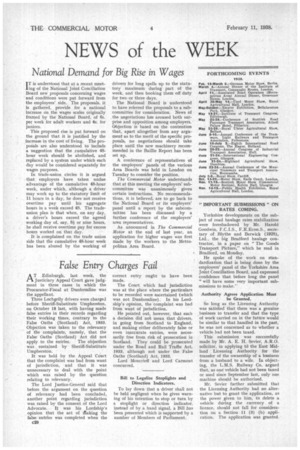NEWS of the WEEK
Page 70

If you've noticed an error in this article please click here to report it so we can fix it.
National Demand for Big Rise in Wages
IT is understood that at a recent meetLing of the National Joint Conciliation Board new proposals concerning wages and conditions were put forward from the employees' side. The proposals. it Is gathered, provide for a national increase on the wages scales originally framed by the National Board, of 6s, per week for adult workers and 4s. for juniors.
This proposed rise is put forward on the ground that it is justified by the increase in the cost of living. The propoials are also understood to include a suggestion that the cumulative 48hour week should be abolished, and replaced by a system under which each day would be considered separately for wages purposes.
In trade-union circles it is argued that employers have taken undue advantage of the cumulative 48-hour week, under which, although a driver may work up to the statutory limit of 11 hours in a day, he does not receive overtime pay until his aggregate hours in a week exceed 48. The tradeunion plan is that when, on any day, a driver's hours exceed the agreed working day of. say, 81 or nine hours, he shall receive overtime pay for excess hours worked on that day.
It is complained on the trade union side that the cumulative 48-hour week has been abused by the working of drivers for long spells up to the statutory maximum during part of the week, and then booking them off duty for two or three days.
The National Board is understood to have referred the proposals to a subcommittee for consideration. News of the negotiations has aroused both surprise and opposition among employers. Objection is based on the contention that, apart altogether from any argument as to the merit of the specific proposals, no negotiations should take place until the new machinery recommended in the Baillie Report has been set up.
A conference of representatives of the employers' panels of the various Area Boards was held in London on Tuesday to consider the position.
The Commercial Motor understands that at this meeting the employers' subcommittee was unanimously given certain instructions. No recommendations, it is believed, are to go back to the National Board or its employers' panel until a report by the subcommittee has been discussed by a further conference of the employers' area representatives.
As announced in The Commercial Motor at the end of last year, an application for higher wages was first made by the workers to the Metropolitan Area Board.




























































































































































